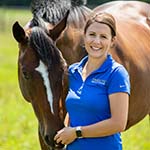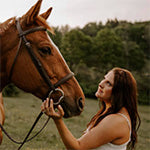A carefully selected horse feed can be the tipping point for a horse’s health, happiness, and performance.
However, the wide variety of commercial horse feeds available can feel daunting. With endless options, pinpointing the best feed that meets your horse's individual needs can quickly turn into a challenge.
This article explains your horse’s basic nutritional requirements, highlights warning signs that a ration is falling short, outlines the main feed categories, and gives you expert tips for how to pick a horse feed that fits your horse’s unique dietary requirements.
Understanding Your Horse’s Nutritional Needs
In the wild, horses can graze up to 18 hours a day. Horses graze continuously because their digestive tract works best with a steady intake of forage.
Due to how a horse's digestive tract functions, a forage-based diet should form the backbone of every horse’s feed program. Free-choice hay—or near-constant access to good pasture grass—helps keep the horse's stomach from sitting empty and provides healthy hindgut fermentation.
Because forage only diets rarely supply enough protein, trace minerals, or vitamins, balanced horse feeds or ration balancers are added to a horse’s diet to fill those gaps.
A forage test followed by feeding the right horse feed will ensure your horse receives exactly what it needs for optimal health and peak performance.
Signs You May Not Be Feeding the Right Horse Feed
A horse’s body often tells the story of whether it’s being fed the correct feed and overall diet before lab results do.
When evaluating whether a horse is not being fed the proper feed, start with a body condition check. While the Henneke Body Condition Score (BCS) rates fat on a 1–9 scale, conformation and fitness can skew this number. Tribute’s Equine Nutrition Wellness System, however, adds topline and fat-pad assessments to provide a more accurate picture of body condition. To see how the Tribute® system works—and how to apply it to your horse—click here.
In addition, watch for these nutrition-driven warning signs that may mean it's time to reassess your horse’s feed program:
-
Body Condition Changes & Topline – Sudden weight swings, a hard-keeper frame, or a flat, hollow topline signal too few calories or a shortage of high-quality protein. Uneven muscling, stiffness, or tying up can point to health concerns and possibly nutritional gaps.
-
Coat, Skin & Hooves – A dull coat, flaky skin, or brittle, cracked feet can reflect shortfalls in nutrients like zinc, copper, biotin, essential fatty acids, or selenium.
-
Behavior & Performance – Loss of impulsion and mid-ride fatigue can indicate calorie, electrolyte, or trace-mineral deficits. Soil-licking and wood-chewing tend to be boredom behaviors but may indicate a lack of quality fiber and salt in the diet. At the same time, frequent coughs, minor infections, or new allergies may indicate antioxidant deficiencies.
-
Growth, Recovery, and Fertility – Sluggish foal growth, slow post-work recovery, or erratic broodmare cycles can stem from a lack of lysine, zinc, selenium, vitamin E, or simply not enough fiber- and fat-based calories.
Unfortunately, even “balanced” horse feeds can fall short if you aren't feeding the correct amount of them. Additionally, choosing horse feed formulas that use poorly bioavailable minerals and combining them with forage naturally high in iron or calcium, which blocks the uptake of copper, zinc, and phosphorus, can allow a horse's diet to fall short of its needs. Long stretches without fresh pasture grass can also leave stabled horses short on vitamin D and omega-3 fatty acids unless you supply them elsewhere in their diet.
Other management missteps that suggest your horse’s feed may need reassessing include:
-
Feeding Errors – Giving far less or more than the label’s daily recommendations, but the horse remains in an incorrect body condition. Serving meals over 5 lb (2.3 kg) for a 1,100-lb (500 kg) horse, which strains the hindgut.
-
Patchwork Diets– Relying on a mixture of horse feeds and supplements to compensate for an incorrect “base” feed, which also inflates overall diet costs.
-
No Diet Adjustments – Not modifying the horse's diet or feed when things like workload, age, or environment change.
-
Health Blindspots – Overlooking new conditions (PPID, ulcers, insulin dysregulation, HYPP) that typically require a shift in a horse’s nutritional needs.
If any of these warning signs sound familiar, an equine nutrition specialist can perform a comprehensive diet review to see if your horse isn’t getting the right feed or amount of feed for their specific needs and health conditions.
Types of Horse Feed
Horse feed isn’t one-size-fits-all. Each type of horse feed category suits particular calorie needs, forage situations, or metabolic profiles. Some of the most common types of horse feed include:
Textured (“Sweet”) Feeds
Molasses-coated grain mixtures that supply quick, palatable energy for hard-working horses that tolerate the typically higher NSC levels in sweet feeds. However, the starch/sugar load can spike glucose and insulin levels, potentially risking health concerns in metabolic and NSC-sensitive horses.
Pelleted Feeds
Pelleted feed mills grains, forage byproducts, and supplements into a uniform mash, then presses it into pellets that prevent ingredient sorting. These feeds typically contain added fat and fiber for balanced nutrition. However, NSC and other nutrient levels may vary, so always check the nutrition label for accurate information.
Ration Balancers
Nutrient-dense ration balancers supply nutrients like protein, vitamins, and minerals without extra calories, unlike full-intake horse feeds. Commonly used for easy keepers or as a top-dress addition to complete feed for a boost of nutrients.
Complete or Senior Feeds
A high-fiber, fully fortified complete feed, more commonly referred to as senior feed, contains enough fiber to serve as the horse’s sole diet when hay is scarce or forage chewing is difficult.
High-Fat Performance Feeds
Calorie-packed mixes (typically 10%+ fat) offering “cool” energy for hard-working horses or hard keepers, commonly without significant NSCs.
Low-NSC Feeds
Starch- and sugar-restricted blends (typically ≤ 15% NSC) ideal for insulin-resistant, PSSM, or laminitis-prone horses needing controlled calories from NSCs.
Forage Cubes & Pellets
Compressed alfalfa, timothy, or mixed-forage cubes/pellets that add dust-free forage to the horses' diet and serve as a convenient hay substitute.
How to Find the Best Horse Feed: 5 Expert Tips
Evaluating the horse's entire diet, rather than just individual ingredients of the feed, is crucial. Ideal horse feeds should be nutritionally balanced, come from brands with strict quality control protocols, and be fed consistently each day.
The top six tips for finding the best horse feed include:
-
Start With a Forage Test
A hay or pasture analysis identifies the nutrients, such as protein, energy, and mineral levels, that your horse already consumes. This information isn’t something a visual check can reveal and should guide your horse feed choice.
-
Check Intake Against NRC Guidelines
Add up nutrients from forage and horse feed, then compare them to the National Research Council (NRC) tables for your horse’s weight, age, and workload to ensure nothing is lacking at a baseline level. However, an equine nutritionist can more precisely confirm that the diet meets your horse’s fundamental needs.
-
Choose Fixed-Formula Feeds from Audited, Ionophore-Free Mills
Choose from brands that use consistent formulations and mill horse feeds separately from those used for cattle or poultry lines. Rigorous mycotoxin testing and strict quality controls ensure that every bag matches the label and remains free of dangerous contaminants, such as monensin. Even trace contamination with cattle additives, such as monensin, can be fatal to horses.
-
Watch For Common Gap Nutrients
Field audits and bloodwork show selenium, vitamin E, zinc, and copper can commonly be deficient, especially in primarily hay-fed horses. Enlisting the help of an equine nutrition specialist is an excellent way to ensure there are no nutritional gaps in a horse's feed based on their specific needs.
-
Review and Adjust Regularly
Re-evaluate the horse's feed and overall diet whenever hay source, workload, health status, or body-condition score changes, and consult with your equine nutrition specialist regularly to keep nutrition on point day after day.
Browse Tribute Equine's Quality Horse Feed Options and Personalized Horse Feed Plans
Tribute® produces every horse feed bag in their own state-of-the-art, ionophore-free mills and uses fixed formulations, so each batch delivers the same balanced nutrient profile. Rigorous quality checks—combined with highly bioavailable minerals and targeted digestive-support additives—lock in consistency and top-tier quality in every bag.
Tribute’s best-selling formulas also feature Uptake Technology™—a proprietary blend of organic trace minerals, enzymes, and pre- and probiotics that maximizes nutrient absorption and supports gut health in every bag, as well as Constant Comfort®, a premium seaweed derived calcium that promotes a healthy gastric pH to help horses at risk of ulcers and digestive upset.
Below are some of Tribute’s most popular horse feeds that are geared toward different types of horses’ calorie needs, metabolic status, and forage:
-
Essential K® (Ration Balancer) – Ultra-concentrated, corn-, oat-, and molasses-free, supplies amino acids, vitamins, and trace minerals without unnecessary calories and ideal for easy keepers on good pasture or as an additive to a full-intake feed to boost nutrient levels when needed.
-
Kalm ‘N EZ® Pellet – Low-NSC (13.5 %), higher-fat, high-fiber feed formulated for moderate to hard keepers that are sugar- and starch-sensitive, such as PSSM, insulin-resistant, or “hot” horses needing “cool” energy.
-
Kalm Ultra® – Soft, no-corn pelleted formula delivering 12% fat for the hard-keeping or hard-working horses. With additional pre- and probiotics, it's a top choice for horses that require dense calories.
-
Senior Sport® – Textured 10% fat, 18% fiber feed that appeals to the pickiest eaters and is low enough in NSC for sugar-sensitive seniors, yet caloric enough for older athletes or horses on poor-quality hay.
-
Synergize® – 13% fat, 20% fiber pellet with 15 % NSC, supplying “cool” calories for hard keepers and performance horses.
Tribute® Equine Nutrition specialists will commonly ask horse owners questions to help them find the perfect type of horse feed and amount, such as:
-
Body Condition Score (BCS) and Tribute® Wellness Scores
-
Workload—type, frequency, and intensity of exercise
-
Health history—diagnosed conditions, medications, metabolic concerns
-
Current diet—hay type and amount fed, current feed program, and supplements
If choosing the proper feed for your horse feels overwhelming, let the Tribute® team handle it for you with a free, personalized feeding program tailored to your horse's needs.
References
-
MSD Veterinary Manual. Nutritional requirements of horses and other equids: Management and nutrition https://www.msdvetmanual.com/management-and-nutrition/nutrition-horses/nutritional-requirements-of-horses-and-other-equids
-
Ermers C, van Dooren C, van Leeuwen E, et al. The fibre requirements of horses and the consequences and causes of failure to meet them. Animals (Basel). 2023;13(8):1414. https://doi.org/10.3390/ani13081414
-
3. Hathaway M, Catalano D. Ten things you should know about feeding the mature horse. University of Minnesota Extension [Internet]. Reviewed 2021. Available from: https://extension.umn.edu/horse-nutrition/ten-things-you-should-know-about-feeding-mature-horse
-
Bickel B. The scoop on grains and concentrates. Penn State Extension [Internet]. Updated 2024 Jan 29. Available from: https://extension.psu.edu/the-scoop-on-grains-and-concentrates


